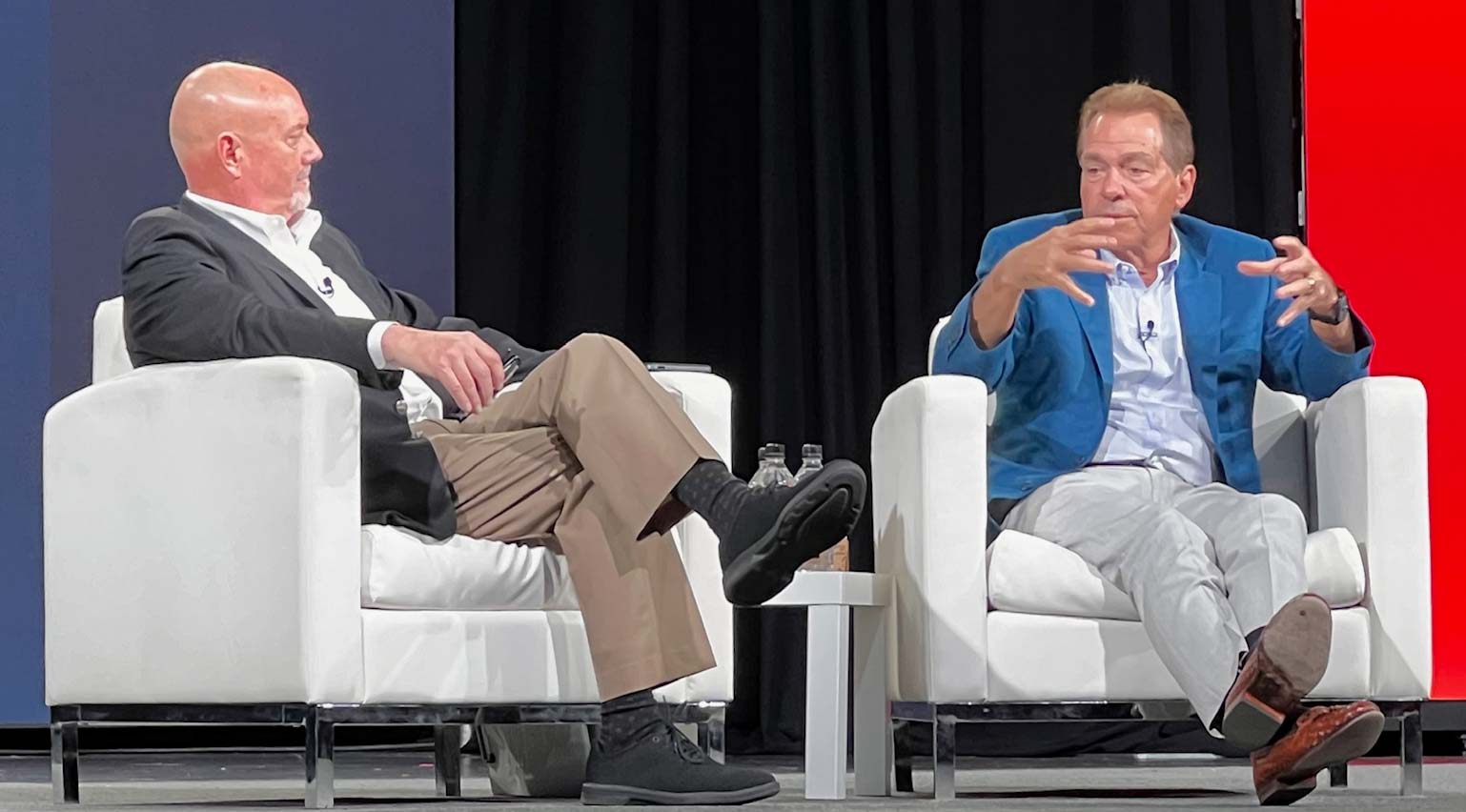Football Coach Nick Saban Delivers a Winning Talk on Goal Setting, Team Development and Success
Print this Article | Send to Colleague
 |
On Wednesday morning, Nick Saban, legendary Alabama football coach, delivered a keynote with inspirational advice on facilitating a winning culture and developing talent. The conversation was led by Mitch McConnell of AGiLE Business Media.
Saban, who led Alabama to seven national championships and 10 SEC titles, knows something about winning. He frequently gets asked what it takes to win, and his answer is always the same: have a gameplan, hire a good staff, prepare and have a solid system in place. But the most important thing is to ask yourself what kind of culture you'd like to build.
Saban said in order to create a winning culture, you need the following:
1. Everyone has to have the same goals and aspirations for what you’d like to accomplish. At Alabama, he'd ask players what their goals were and if they knew what it would take to achieve those goals, later checking on their progress, which encouraged self-assessment. Saban said that in order to achieve goals, you need to have self-discipline, prioritize daily tasks and focus on their completion. Saban said, “It takes what it takes, and there are no shortcuts – there will be pain either way, either the pain of discipline or the pain of disappointment.”
First, define the principles and values of the organization, and once those have been established, the team needs to trust in the value of those principles and values, and also trust each other.
Saban said that if you let high achievers and mediocre people coexist in your organization, you’ll never succeed. He said, “Get the right people on the bus, get the wrong people off the bus, and get everyone in the right seat.”
2. Your entire team has to be consistently positive about what you’re trying to accomplish. Instill positive energy by making a practice of saying, “Glad to be here,” on a daily basis. That positivity makes you focus on opportunity instead of negativity. Positive energy and attitude go a long way.
3. Everyone must be accountable for their own performance. You define expectations and roles, but there needs to be individual accountability through work ethic, perseverance and the ability to overcome and solve problems. Saban said that you can recruit talent but you can’t recruit accountability.
Saban also discussed his background. As a kid, Saban worked for his dad at his gas station, and his dad pushed Saban to do an exemplary job, which set his work ethic at an early age. His dad started a Pop Warner youth football team and was really invested in the team’s success – he even bought a school bus to pick up the team. Saban said that, throughout high school and college, he had good mentors, but never wanted to be a coach – his aspiration was to be the manager of a car dealership. In college, his coach wanted him to be a graduate assistant, and since his then-fiancé had another year of college left, he took the job. Forty years later, after huge success as a coach, he now owns car dealerships – it was a backwards journey, he said.
McConnell asked what has changed in college football and what remained the same. Saban said that something that will never change is what it takes to be successful. Perseverance and pride in performance will still be the key, even as people, culture and football itself will change. He also mentioned recent changes in college football. Previously, players could not be paid, but now pay-for-play is allowed, and according to Saban, this changes the dynamic of why players are going to college at all. While Saban doesn’t disagree with paying players, he thinks allowing pay-for-play in addition to changes to the rules of the transfer portal will eventually hurt the players and college football.
McConnell asked about Saban’s friendship with Bill Belichick, and Saban said they met when he was coaching at the Naval Academy – Bill’s dad worked at the Naval Academy. When Belichick was head coach of the Cleveland Browns, Saban was defensive coordinator. Saban said Bellicheck knew exactly what he was looking for in players – he defined the expectation of players, coaches and personnel so they were all on the same page.
What’s next for Nick Saban? Moving forward, Saban said he likes staying busy. He’ll be on ESPN and at some Game Days, and will be active with his multiple Mercedes dealerships. And, he really wants to continue being involved in college football.
McConnell’s final question was the most valuable lesson Saban has learned on or off the field. Saban said the most important lesson involved a total change in philosophy. He was always very outcome-oriented and was a transactional leader, overly focused on winning and results, but was very critical when mistakes were made. He had a realization that if you’re negative without teaching, you don’t make real progress. Instead of worrying about the outcome – winning or losing – you have to focus on making sure everyone is doing what you need them to do. Serve other people and help them be the best they can be. By looking at individual performance, your team will succeed overall.

